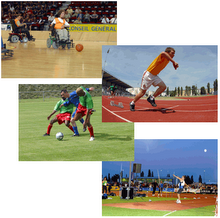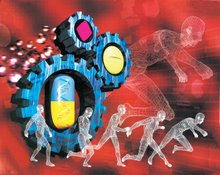

Coffee was first discovered over 1000 years ago, and currently approximately 75% of Americans drink coffee on a regular basis. Despite the thousand years that have passed, there is still mystery and controversy surounding the biological effects of coffee and it's principal active ingredient, caffeine. Caffeine is the most widely used stimulant drug in the world, usually ingsted in the form of coffee, tea, soft-drinks, and chocolate. Table 1 shows the relative caffeine content of these food items. Caffeine is also used by triathletes and other athletes as a peformance aid. The purpose of this article is to discuss the role of caffeine as an ergogenic (energy generating) aid in endurance sports and to discuss the health issues related to caffeine use.
What happens when caffeine enters the body
Caffeine is well absorbed from by the stomach and intestine, and peak blood levels occur about 45 - 60 minutes after ingestion. Once in the blood stream, caffeine causes a number of responses in the body. Caffeine is well known for it's stimulant effects on the brain, but there are a number of other physiologic effects that occur. Blood pressure, pulse rate, and stomach acid production are increased, fat stores are broken down, and fatty acids are released into the blood stream. These effects can last from a few hours to as long as 12, but within 4 days of regular use, the body develops tolerance to many of the effects of caffeine. For example, although caffeine increases blood pressure and pulse in a first time user, a regular user will not experience any significant change.
Caffeine and Health
In making a decision whether or not to use caffeine -- or any other drug -- it is important to consider the potential adverse effects on health. These can be separated into short term (ie. related to a single dose) and long term. The short term affects of caffeine are much better understood than the long term effects.
Because caffeine increases the production of stomach acid it may worsen ulcer symptoms or cause acid reflux ("heartburn"). Insomnia, poor sleep, and anxiety are well described psychological side effects of caffeine. Regular evening use of caffeine may, over time, deprive the body of proper sleep, resulting in lack of energy and fatigue.
Many studies have suggested a relationship between chronic caffeine use and a number of diseases. Proving a cause-and-effect, however, has been difficult and most of these suggested links remain inconclusive. Some of the difficulties that arise in studying the long term health effects of caffeine are due to problems in accounting for other lifestyle variables (eg. smoking, alcohol consumption, exercise), differences in genetic inheritance, form of caffeine intake (coffee, tea, sodas), and the presence of other biologically active substances in the beverage. For example, one study looked at the whether caffeine intake increased the risk of heart disease. Over 45,000 people were evaluated and the data indicated a slightly increased risk of death from heart disease in individuals who had an average daily consumption of more than 5 cups of *decaffeinated* coffee. Currently, there is no evidence that caffeine causes cancer, stomach ulcers, high blood pressure, or serious heart arrhythmias.
Because caffeine increases the production of stomach acid it may worsen ulcer symptoms or cause acid reflux ("heartburn"). Insomnia, poor sleep, and anxiety are well described psychological side effects of caffeine. Regular evening use of caffeine may, over time, deprive the body of proper sleep, resulting in lack of energy and fatigue.
Many studies have suggested a relationship between chronic caffeine use and a number of diseases. Proving a cause-and-effect, however, has been difficult and most of these suggested links remain inconclusive. Some of the difficulties that arise in studying the long term health effects of caffeine are due to problems in accounting for other lifestyle variables (eg. smoking, alcohol consumption, exercise), differences in genetic inheritance, form of caffeine intake (coffee, tea, sodas), and the presence of other biologically active substances in the beverage. For example, one study looked at the whether caffeine intake increased the risk of heart disease. Over 45,000 people were evaluated and the data indicated a slightly increased risk of death from heart disease in individuals who had an average daily consumption of more than 5 cups of *decaffeinated* coffee. Currently, there is no evidence that caffeine causes cancer, stomach ulcers, high blood pressure, or serious heart arrhythmias.
Caffeine Withdrawal
Abrupt discontinuation of caffeine in a regular user may trigger caffeine withdrawal symptoms. The most common symptoms are headache and fatigue. The headache may begin as soon as 18 hours following the last dose of caffeine and may worsen with exercise. It is not known why some people experience caffeine withdrawal and others do not.
Caffeine and Athletic Performance
Despite considerable research in this area, the role of caffeine as a performance enhancing drug is still controversial. Some of the data are conflicting, which is in part due to how the experimental studies were designed and what methods were used. However, there is general agreement in a few areas:
1. Caffeine does not appear to benefit short term, high intensity exercise (eg. sprinting)
2. Caffeine can enhance performance in endurance sports.
Glycogen is the principal fuel for muscles and exhaustion occurs when it is depleted. A secondary fuel, which is much more abundant, is fat. As long as there is still glycogen available, working muscles can utilize fat. Caffeine mobilizes fat stores and encourages working muscles to use fat as a fuel. This delays the depletion of muscle glycogen and allows for a prolongation of exercise. The critical time period in glycogen sparing appears to occur during the first 15 minutes of exercise, where caffeine has been shown to decrease glycogen utilization by as much as 50%. Glycogen saved at the beginning is thus available during the later stages of exercise. Although the exact method by which caffeine does this is still unclear, caffeine caused sparing in all of the human studies where muscle glycogen levels were measured. The effect on performance, which was observed in most experimental studies, was that subjects were able to exercise longer until exhaustion occurred.
In addition to the beneficial effects on muscle, caffeine may alter the perception of how hard you are working. During testing, athletes are asked to judge their effort, which is referred to as the rating of perceived exertion (RPE). Some studies have yielded significantly lower RPE's -- less fatigue -- when the athlete used caffeine. Other studies have not found this effect. Obviously, the RPE is very subjective, and there are many things that may influence it.
1. Caffeine does not appear to benefit short term, high intensity exercise (eg. sprinting)
2. Caffeine can enhance performance in endurance sports.
Glycogen is the principal fuel for muscles and exhaustion occurs when it is depleted. A secondary fuel, which is much more abundant, is fat. As long as there is still glycogen available, working muscles can utilize fat. Caffeine mobilizes fat stores and encourages working muscles to use fat as a fuel. This delays the depletion of muscle glycogen and allows for a prolongation of exercise. The critical time period in glycogen sparing appears to occur during the first 15 minutes of exercise, where caffeine has been shown to decrease glycogen utilization by as much as 50%. Glycogen saved at the beginning is thus available during the later stages of exercise. Although the exact method by which caffeine does this is still unclear, caffeine caused sparing in all of the human studies where muscle glycogen levels were measured. The effect on performance, which was observed in most experimental studies, was that subjects were able to exercise longer until exhaustion occurred.
In addition to the beneficial effects on muscle, caffeine may alter the perception of how hard you are working. During testing, athletes are asked to judge their effort, which is referred to as the rating of perceived exertion (RPE). Some studies have yielded significantly lower RPE's -- less fatigue -- when the athlete used caffeine. Other studies have not found this effect. Obviously, the RPE is very subjective, and there are many things that may influence it.














Hiç yorum yok:
Yorum Gönder